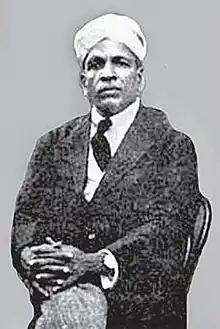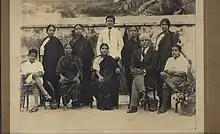A. Madhaviah | |
|---|---|
 | |
| Born | August 16, 1872. Perungulam |
| Died | October 22, 1925 (aged 53) Chennai |
| Language | Tamil, English |
| Genre | social reform, classical literature, history |
| Notable works | Padmavathi sarithiram (1898) |
| Spouse | Meenakshi |
| Children | Meenambal, Lakshmi, Visalakshi, Muthulakshmi, Saraswati, M. Anantanarayanan, P.M.Y. Narayanan & M. Krishnan |
| Website | |
| www | |
Anantanarayanan Madhaviah (16 August 1872 – 22 October 1925)[1] is one of the pioneer Tamil writers, novelists and journalists. His writings were about social reformation and misogyny in society.[2] He is the author of one the early Tamil Novels named Padmavathi sarithiram.[3]
His book Muthumeenakshi is a commentary on marital politics, sexuality, female illiteracy and patriarchy in his time in south India. His take on the reformation in society can be achieved through education.[4]
Early life

Madhaviah was born in Perungulam, Tirunelveli District. He studied Bachelors degree from Madras Christian College in 1892 and taught in the same college for five years.[5] He married at the age of 15 to 11 year old girl Meenakshi.[6]
Partial works
Novel
In Tamil
- Padmavathi sarithiram (1898)[7]
- Muthumeenakshi (1903)
- Vijayamarthandam (1903)
In English
- Thillai Govindan (1903)
- Satyananda (1909)
- The story of Ramanyana (1914)
- Clarinda (1915)
- Lieutenant Panju (1915)
- Markandeya (1922)
- Nanda (1923)
- Manimekalai (1923)
Critics
His writings are criticized as being ambivalent toward British Protestant missions in the Madras Presidency.[8] During his time the university students in South India had different family background and when they met the western philosophies it created new thoughts for them which were felt reformist in that era.[9]
References
- ↑ "The Life, Works and Vision of a Great Tamilian - A. Madhaviah". www.madhaviah.org. Retrieved 2021-05-22.
- ↑ "A Madhaviah Archives". Katha Books. Retrieved 2021-05-23.
- ↑ ச.தமிழ்ச்செல்வன். "சிறுகதை வரலாற்றின் முதல் மூவரில் ஒருவர் மாதவய்யா!- கதைசொல்லிகளின் கதை பாகம் 2". Ananda Vikatan (in Tamil). Retrieved 2021-05-22.
- ↑ Raman, Sita Anantha (2005). A. Madhaviah: A Biography. Oxford University Press. ISBN 978-0-19-567021-9. Retrieved 2021-05-23.
- ↑ Kaminsky, Arnold P; Long, Roger D, eds. (2016-09-13). "The Modern Tamil Humanism of A. Madhaviah". Nationalism and Imperialism in South and Southeast Asia. Routledge. doi:10.4324/9781315276793. ISBN 9781351997430. Retrieved 2021-05-23.
- ↑ VISWANATHAN, S. (2005-08-26). "Portrait of a novelist as a social reformer". The Hindu. Retrieved 2021-05-23.
- ↑ "அக்டோபர் 22 பத்மாவதி சரித்திரம் தந்த மாதவையா நினைவுநாள்". www.dinakaran.com. Archived from the original on 2021-04-15. Retrieved 2021-04-15.
- ↑ Waha, Kristen Bergman (2018-03-26). "Synthesizing Hindu and Christian Ethics in A. Madhaviah's Indian English Novelclarinda(1915)". Victorian Literature and Culture. 46: 237–255. doi:10.1017/S1060150317000419. S2CID 165304670.
- ↑ Parameswaran, Uma (1986-03-01). "3. A. Madhaviah 1872 -1925: An Assessment". The Journal of Commonwealth Literature. 21 (1): 222–239. doi:10.1177/002198948602100124. ISSN 0021-9894. S2CID 161124736.